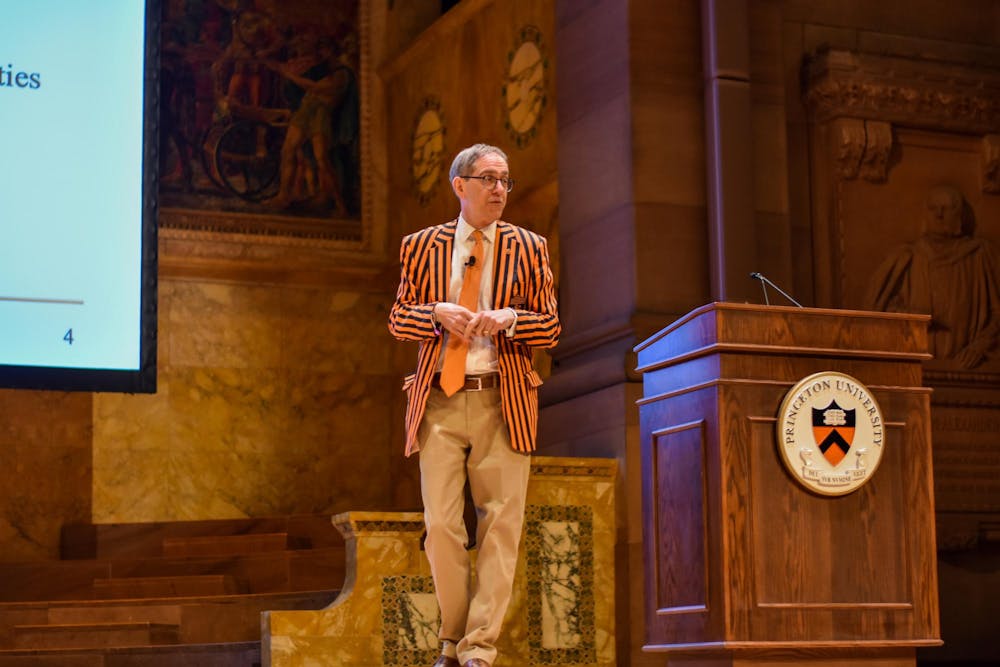President Christopher Eisgruber ’83 released his eighth annual State of the University letter on Jan. 18. In the letter, he addresses recent public discourse surrounding the conflict in Israel and Palestine, distinguishing the University from peer institutions. He also emphasizes freedom of speech, commitment to diversity, and pursuit of academic excellence.
“The campus climate at Princeton has been healthier than at many of our peers,” Eisgruber wrote. “That is a credit to faculty, students, and staff who have searched for ways to communicate civilly about sensitive issues, to support one another, and to comply fully with Princeton’s policies that facilitate free speech in ways consistent with the functioning of the University.”
Campus responses to conflict in Israel and Palestine
When the Israeli-Palestinian conflict escalated in October, students and faculty across college campuses in the U.S. organized protests, invited speakers, and in some instances responded violently. Eisgruber acknowledged two such incidents — referencing when a Cornell student threatened to kill Jewish students, and another in which three Palestinian students from Brown, Haverford, and Trinity were shot and wounded as they headed to a Thanksgiving dinner, two of whom were wearing keffiyehs.
He also commented on the Dec. 5 congressional hearing with the presidents of Harvard, MIT, and Penn regarding antisemitism on their campuses.
Eisgruber stated that with these testimonies, the presidents of these peer institutions “walked into a trap,” and that the “damage has been significant not only for them personally, but also for the reputations of their institutions and for colleges and universities more broadly.”
The presidents’ responses were met with controversy, with many calling for their resignation. Following their testimonies, both Liz Magill and Claudine Gay, presidents of the University of Pennsylvania and Harvard respectively, have since resigned.
The conflict and congressional testimony have caused the general public to raise questions regarding the line between protecting free speech and punishing those who instigate harassment at higher institutions.
Eisgruber has recently emphasized his commitment to free speech in his commencement address to the Class of 2023 and in his statement on the congressional hearings in Dec.
“Universities must protect even offensive speech, but that does not mean we must remain silent in the face of it,” Eisgruber wrote in the letter. “The mere fact that speech is offensive is never grounds for discipline at Princeton; the speech must fall under one of the enumerated exceptions to our free expression policy, such as those permitting the University to restrict threats or harassment.”
While defending free speech, Eisgruber argued that “advising students to avoid offensive speech … is very different from suppressing or punishing that speech.” He cited an example of Dean Amaney Jamal advising students against using “provocative slogans” like “from the river to the sea.”
“We must model and teach constructive forms of dialogue if we are to enable our students to build and inhabit a society more inclusive than the one that exists today,” he noted.

Emphasis on excellence, diversity
Colleges and universities have come under attack not only for their handling of antisemitism, but also for the belief that higher education is placing a greater emphasis on diversity and inclusion rather than scholarly excellence.
Eisgruber called on those in peer institutions to “transcend” their differences when colleges are “wrongly and sometimes dishonestly attacked.”
He referenced a video opinion piece in which CNN journalist Fareed Zakaria alleged, “American universities have been neglecting a core focus on excellence in order to pursue a variety of agendas — many of them clustered around diversity and inclusion.”
Eisgruber challenged this quote, asserting that scholarly excellence and inclusivity can coexist in a university.
“The excellence of America’s leading research universities, including Princeton, depends not only on attracting talented people from all backgrounds but also on ensuring that they can thrive on our campuses,” he wrote. “We know that people face differing barriers to success, and we try to support groups and individuals in ways that meet their needs and allow their talents to develop.”
He also argued that new admissions standards have allowed the university to simultaneously increase diversity and academic success on campus. The University had not always granted admission to women, black students, and Asian students, and admitted limited numbers of public high school students.
Eisgruber praised the elimination of barriers today, including the “trailblazing improvements to both undergraduate financial aid and graduate scholarships” as a reason for Princeton’s graduating classes becoming increasingly diverse and knowledgeable.
He also credited that diversity to the establishment of programs on campus as part of the effort to promote diversity and academic excellence, specifically mentioning the Center for Jewish Life and Gender + Sexuality Resource Center for helping to create places on campus where Jewish and LGTBQ+ students can feel included.
Along with all these improvements, Eisgruber shared data showing that students of the highest academic excellence (Academic 1’s) now make up 50 percent of the matriculated class compared to less than 20 percent in the 1980’s.
Questions around legacy admissions, Supreme Court ruling
Eisgruber also touched on legacy admissions, a practice challenged on campus after the Students for Fair Admissions v. Harvard and Students for Fair Admissions v. University of North Carolina Supreme Court decisions this past summer. He stated that in the early 1900’s, Princeton was known as “a place where privileged young men loafed rather than studied.”
He said that for the University, “sons of Princetonians were overrepresented in the bottom quartile of the class and among those who flunked out.”
In contrast, he said that now, alumni children are “every bit as good” as other students admitted.
Notably, Eisgruber did not address the Supreme Court decisions regarding affirmative action decided this June.
Eisgruber also explained that the diversity of faculty hiring has increased, as has the quality and depth of some programs, including African American studies, bioengineering, and the creative and performing arts, among others.
At the end of his letter, he reinforced his belief in the progress that he believes Princeton has made over the past year and added a hopeful sentiment that the University will continue to improve.
“In short, the Princeton of today is better than that of yesterday, and the Princeton of tomorrow will be even better than the Princeton of today,” Eisgruber stated.
In a Jan. 18 email to the University Community, Eisgruber invited students, faculty, and other members of the University community to discuss his letter at a Council of the Princeton University Community (CPUC) meeting on Monday, Feb. 19 from 4:30–6 p.m. on the B-level of Frist Campus Center. He also noted an additional town hall for University staff on Wednesday, Feb. 21 from 10–11 a.m. in Richardson Auditorium.
Rebecca Cunningham is a senior News writer for the ‘Prince.’
Justus Wilhoit is a senior News writer for the ‘Prince.’
Please send any corrections to corrections[at]dailyprincetonian.com








